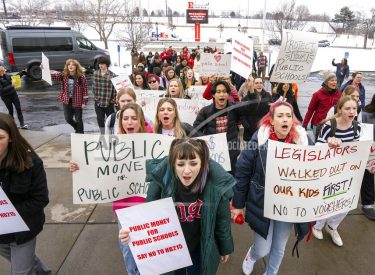GOP pushes vouchers, ‘school choice’ in several states
The Associated Press - January 27, 2023 11:25 am

Students and teachers from East High School in Salt Lake City walk out of school to protest the HB15 voucher bill, on Wednesday, Jan. 25, 2023. Several years of pandemic restrictions and curriculum battles have emboldened longtime advocates of funneling public funds to private and religious schools in statehouses throughout the country. (Rick Egan/The Salt Lake Tribune via AP)
(AP) — In more than a dozen states, Republican lawmakers are pushing legislation this year that would expand or create programs that give millions of taxpayer dollars to families that want to take their children out of public school.
Displeasure with how schools handled pandemic-era closures and mask rules, as well as simmering concerns about curriculum — including how matters of gender and race are taught — have brought newfound energy to a decades-old push for so-called “school choice” policies that shift taxpayer funding allocated to individual students away from public schools to allow parents to instead pay for options such as private schools or homeschooling.
The proposals have kindled fury and resistance from teachers unions and their Democratic Party allies, who argue the dollars would be better spent bolstering public schools. They worry the programs are a stepping stone toward privatizing public education.
From Utah to Kansas, legions of students, parents, and teachers have trekked to the marble floors of their state Capitols to demonstrate in favor or against voucher-style “education savings account” proposals.
Funneling public funds toward private schools is a decades-old idea that first gained traction in the 1990s.
Today, so-called school choice policies include vouchers, scholarships, education savings accounts, and tax credits. There is significant overlap between the policies, and the way they’re labeled is frequently politicized.
Vouchers traditionally allow parents to take the funds that would otherwise be used to educate their children in public schools and use them toward tuition for accredited private or religious schools.
Education savings accounts and scholarship programs are similar but more expansive, allowing parents to spend the money on private school or expenses for home schooling. They’ve steadily grown in popularity over traditional vouchers due to legal challenges in states with constitutional limits on sending public money directly to religious organizations.
Tax credits allow families to deduct amounts from their overall tax burden to be used toward alternatives to public school.
Arizona and West Virginia are the only states with voucher-style programs open to any student who wants to apply.
Many states have scholarship and voucher programs that are limited to specific student populations, such as students with disabilities in schools that may lack the resources to educate them.
Oklahoma is among the states with legislatures that are considering or likely to consider proposals this year. Governor Stitt has suggested plans to push for voucher-style policies.



